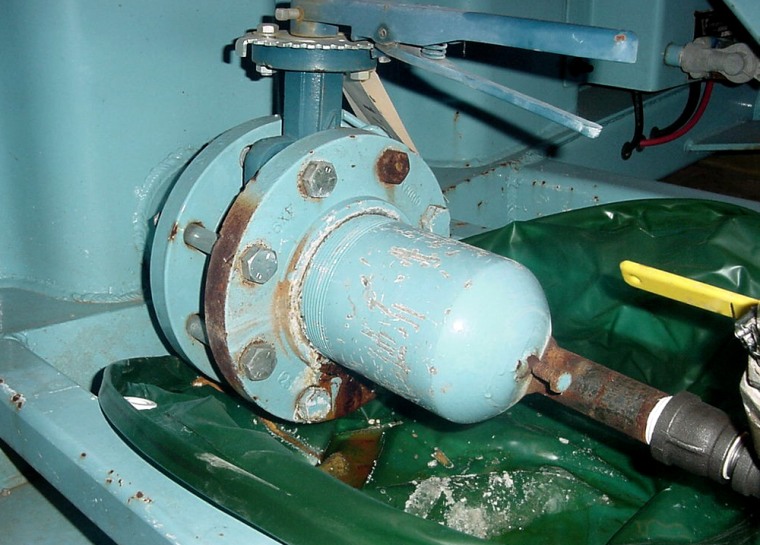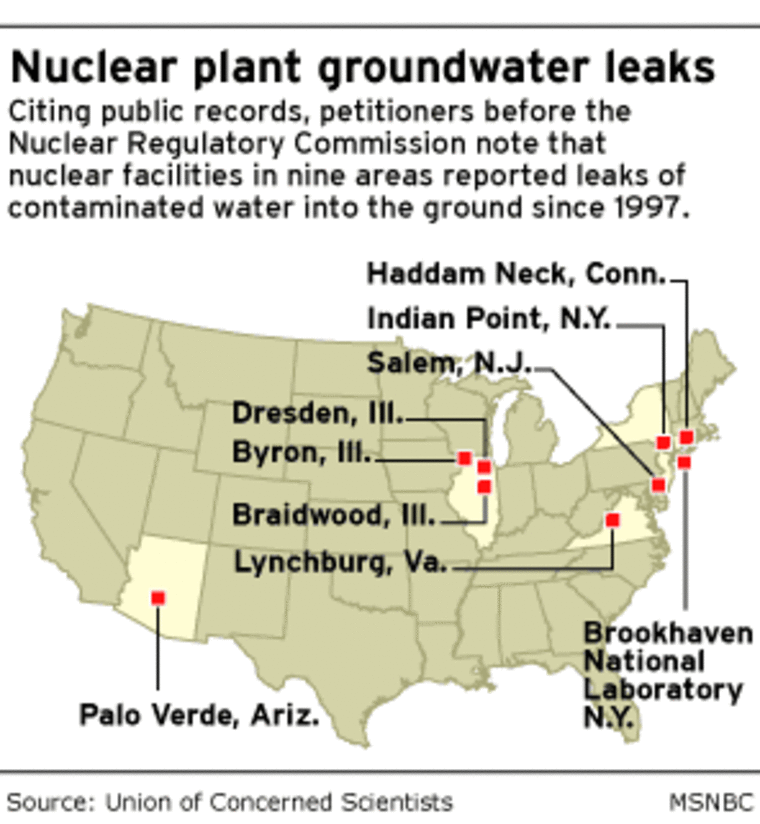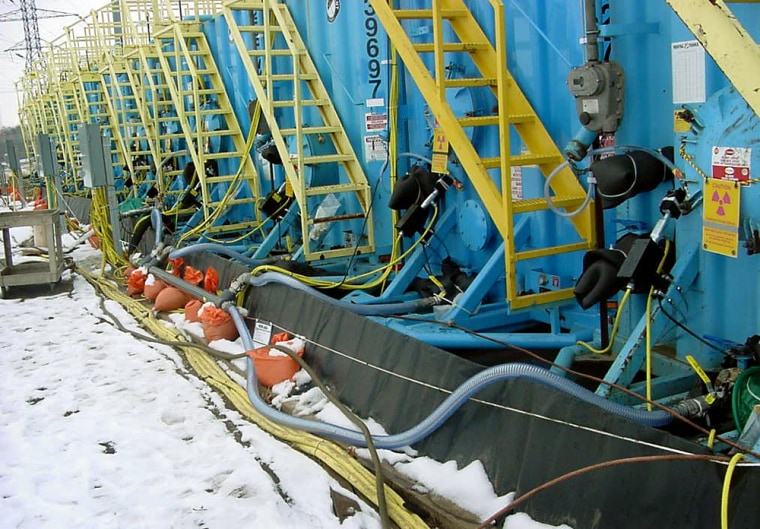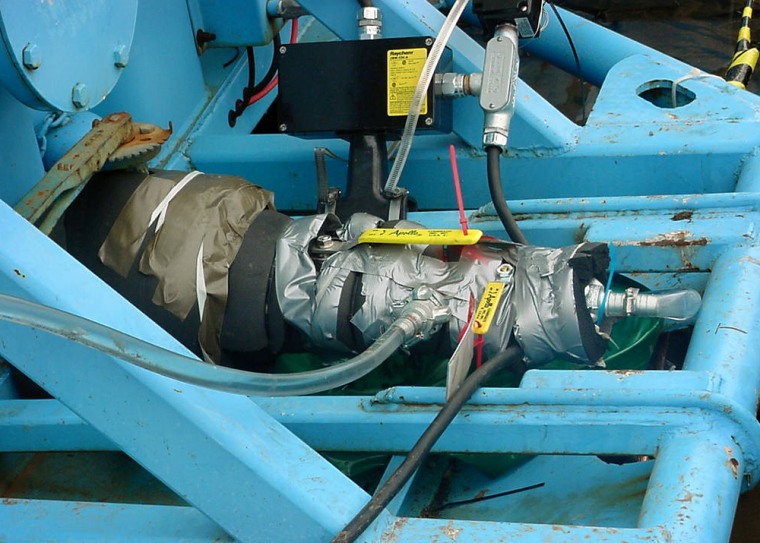Public fears about nuclear power plants have usually centered on massive radiation releases into the air, but recent leaks of water contaminated with low-level radiation have raised a new concern: Local groundwater supplies could become a source of long-term radiation exposure with potential health risks.
Are the leaks just a coincidence or signs of a trend? That’s what the Nuclear Regulatory Commission will weigh on Wednesday when it hears from petitioners demanding that the nuclear industry disclose all information it has on any such incidents.
“We’ve accepted the petition ... we agree that they’ve raised a legitimate issue,” says NRC petition manager Bill Reckley. “We will consider what they suggested.”
The federal agency agreed to a meeting after a petition by 22 environmental groups last January cited leaks in the last decade at nuclear power sites in Braidwood and Dresden, Ill.; Lynchburg, Va.; Salem, N.J.; Haddam Neck, Conn.; and Indian Point and Long Island, N.Y.
Since the petition was filed:
- Two more plants — at Palo Verde, Ariz., and Byron, Ill. — have reported groundwater leaks.
- Illinois has sued Exelon over the Braidwood spill, caused by a broken concrete pipe.
- A new spill was reported at Indian Point.
Most of the leaks involve tritium, a byproduct of nuclear power generation. Tritium also occurs naturally at low levels, but large amounts, if ingested, can lead to cancers, birth defects and miscarriages.
The biggest known tritium leak was at Exelon’s nuclear reactor at Braidwood, where 3 million gallons of tainted water spilled in 1998 and 2000. Late last year, tests detected tritium in the well of a nearby homeowner, indicating that the leak had spread.
The NRC said the tritium levels were just 10 percent of what the Environmental Protection Agency allows in drinking water, but the finding was significant because it showed the tritium had spread over time.
Task force created
At an industry conference on March 7, NRC Chairman Nils Diaz urged the industry to “proactively address” what he called releases that were “uncontrolled and identified after the fact.”

Three days later, the NRC's executive director for operations, Luis Reyes, created a “lessons learned task force,” stating in his order that “although the measured levels of tritium thus far do not appear to present a health hazard to the public, I believe it is necessary to do a broad review to determine whether this is a generic issue for NRC licensees and to recommend possible agency actions to be taken in this area.”
The United States is home to 103 commercial nuclear reactors, all at least 30 years old, and petitioners fear many leaks have gone undetected.
“I fully expect about a quarter of the remaining plants to have leaks,” says Dave Lochbaum, a nuclear specialist at the Union of Concerned Scientists, one of the petitioners.
Petitioners: NRC was slow
The petition doesn’t claim that the leaks have threatened public health. Instead, it asks the NRC to require that plant operators detail any leaks and their methods for tracking them.
And it accuses the agency of having “treated these leaks as isolated events” by not requiring operators to check for similar leaks at other plants.

“The NRC has not taken steps necessary to ensure that members of the public are not now being exposed to radiation from undetected leaks,” the petition stated.
Lochbaum says he doesn’t expect any newly reported leaks “to approach or exceed the leak at Braidwood” but feels it's incumbent upon the NRC “to make sure there are no surprises out there” — either with tritium or any other potential contaminant from broken pipes or cracks in pools used to cool off highly radioactive spent nuclear fuel.
Petitioners also question how industry has responded so far, citing photographs submitted by Exelon to the NRC of a temporary wastewater collection at Braidwood. One photo shows a valve covered in duct tape; another shows a catch basin for a leaky pipe.
The demands made on industry, Lochbaum says, could amount to a couple million dollars per plant. “Compared to cost of cleaning it up,” he adds, “it’s cheap insurance.”
Industry perspective
For the industry, the leaks come as nuclear power has gained momentum. After a 20-year construction hiatus in the United States triggered by Chernobyl and Three Mile Island, several companies have said they hope to build reactors in the next decade.
Ralph Andersen, directorof health policy for the Nuclear Energy Institute, says the industry has been acting on the groundwater issue since a public meeting with the NRC in December.
Operators recognized that the system for reporting and monitoring groundwater spills hasn’t worked well, he says.
“Some opportunities for improvement with regards to monitoring on site” exist, he says. “We need a process that identifies things earlier.”
“This isn’t a significant health and safety issue,” he says of low-level radiation in groundwater, but “it clearly is one of trust and confidence.”
“That issue of communication is clearly one that we need to deal with,” he adds.
Task force goal: Late July
The agency task force has set the end of July as its goal for recommendations.
Lochbaum says he was “very encouraged” after a meeting last month with NRC and industry staff, and agrees with Andersen that the issue comes down to getting neighbors to trust nuclear plants.

“The real question” that the industry needs to answer, he says, “is: ‘What is your tritium doing in my well?’”
For Andersen, that’s also the heart of the matter. “The fact that it’s there and not supposed to be there,” he says, “is what we’re trying to solve.”
But as civil as the discussion, nuclear power is still grist for fireworks.
In Illinois, state prosecutor James Glasgow alleged in filing the lawsuit that Exelon operates within “a culture of greed and deception.”
And in New York, Attorney General Elliot Spitzer, a Democrat running for governor, said last month that closing the Indian Point nuclear plant was “an environmental imperative.”
